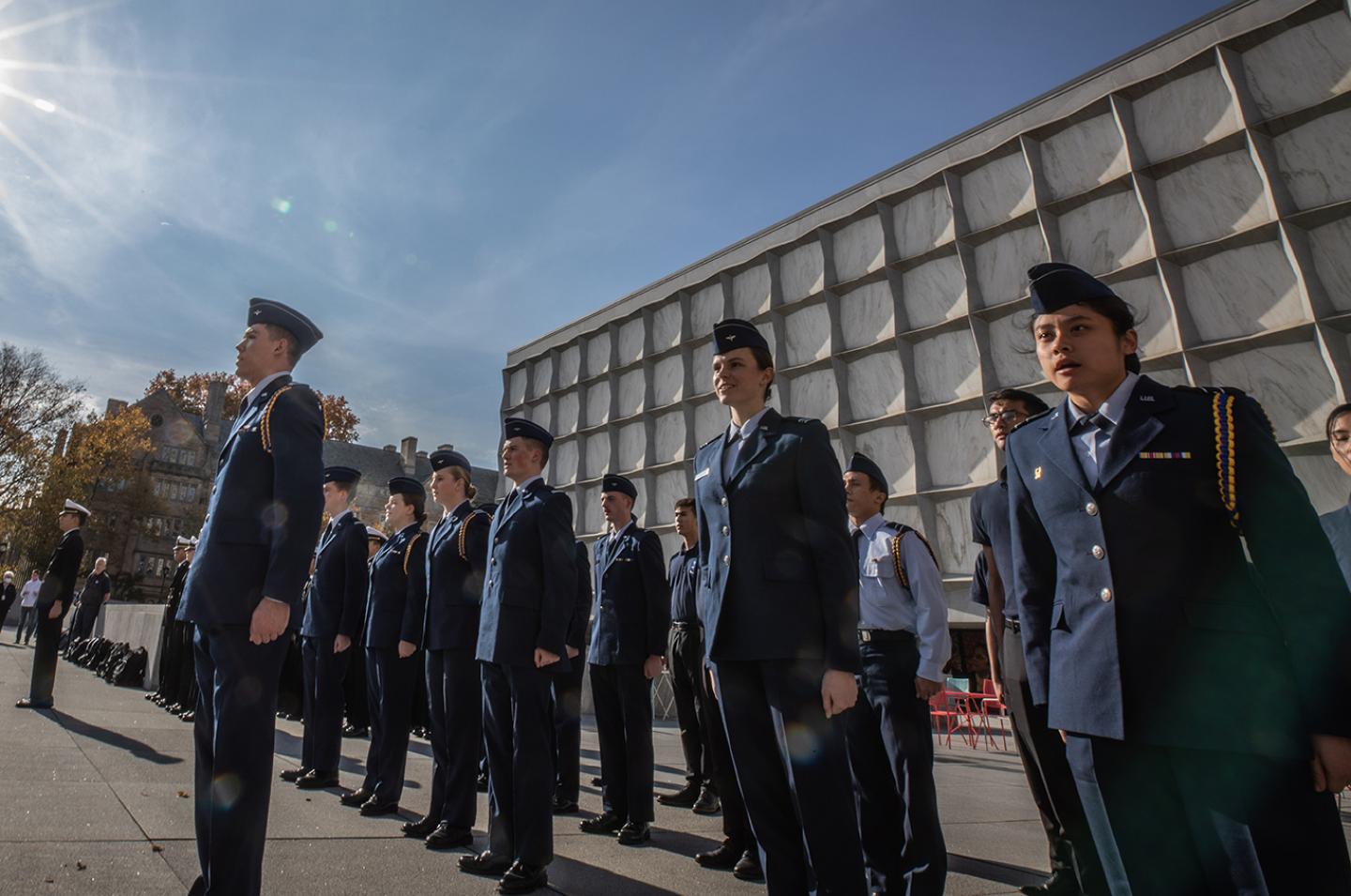“I graduated from Yale in 1968, and my draft notice arrived in the mail seven days later,” says Hugh McCombs ’68, who went on to serve for more than 14 months in Vietnam. When McCombs returned from his combat tour, he enrolled in law school, where he found himself struggling socially and emotionally.
“The world had changed, and so had I,” he says. “It was difficult to integrate myself into the student body. What really made a difference for me was finding community with other veterans—people who just got it.”
Now, McCombs has established the Hugh McCombs ’68 Veterans Resource Fund to help today’s veterans transition to life at Yale. He is one of many donors who have chosen to focus their giving on improving the veteran experience at the university.
“Veterans come to Yale with a completely different life experience and set of needs compared to most first-years,” McCombs says. “It’s important to have a fund available for these folks that Yale can draw from to cover unanticipated expenses or bureaucratic gaps in Veterans Affairs funding.”
Holly Hermes, the inaugural university liaison for Veteran and Military Affairs, couldn’t agree more. Since spring 2023, Hermes has worked to bring together Yale’s veteran community and connect them with the resources they need to succeed.
Creating Community
Today, more than 200 United States military veterans attend Yale, a number that has been steadily rising in the last few years. Hermes sees her office as “creating connective tissue” between veterans on different parts of campus and helping those students make the most of their Yale experience.
“My job is about fostering community, and funding makes that possible,” Hermes says. “It’s helping cover the costs of doing an internship, conference, or program. It’s covering the bill at Mory’s for a group of veterans to meet up and grab dinner and connect. It’s bringing an interesting speaker to campus or taking a group of twenty veterans on a trip to Carnegie Hall.”
Bringing veterans together also helps them take care of each other through the challenges of returning to civilian life.
“Some of our student veterans come to us with mental health challenges different from those of the traditional student population,” Hermes says. “My office helps them access Yale’s mental health resources, the Veterans Administration’s mental health resources, and find support from other people who understand what they’re going through.”
Her office also supports students in the Reserve Officer Training Corps (ROTC), and she’s found that ROTC students often benefit from connecting with student veterans, who can serve as mentors and help prepare them for leadership roles in the military.
Bridging the Military-Civilian Divide
J Gary Kosinski ’90 established the Endowment for Military Veterans at Yale with the goal of benefiting the broader Yale community, not just veterans themselves.
“My friendships with two Yale College classmates, both Army veterans, had a real positive impact on my experience as an undergraduate,” Kosinski says. “They both brought such a valuable perspective to campus, and we all found their personal experience eye-opening compared to everyone else on campus.”
For McCombs, fostering relationships and dialogue between civilians and veterans is key to a well-rounded Yale education.
“Yale is training the next generation of leaders, and it’s important for those leaders to know people who have actually served in the military,” McCombs says. “If you’re going to make decisions about where to deploy troops into combat, it’s beneficial to have an understanding of what it’s like to actually get sent into a war zone.”
Hermes says that leadership training is central to how she thinks about her work.
“While Yale prepares veterans to be leaders in the civilian world, we are also preparing ROTC students to be leaders in the military world,” Hermes says. “And, for civilian students who never plan to serve in the military, we are preparing them to be leaders who have built relationships with veterans. When Yale students sit in class, play on sports teams, do research, and live with veterans, it broadens their perspective and helps bridge the military-civilian divide.”
Filling in the Gap
“If, when I was at Yale, I’d been able to rub elbows with people who’d already given time in their lives in service of their country in a meaningful way, it would’ve made a real impact on me,” says US Navy veteran Howard “Smoky” Bissell ’59, who established the Bissell Fund for Veterans in honor of his late father, Howard Bissell ’35, a US Navy Submarine Commanding Officer in World War II.
“Back when I went to Yale, we were all largely of the same ilk. I think the diversity at the university today must be so beneficial, and if I can play any role in helping people who have served their country be a part of the Yale community, I’m thrilled to do so.”
Hermes says that scholarships like the one Bissell started are integral to keeping Yale accessible to veterans. Even the full benefits of the GI Bill and Yellow Ribbon program do not always fully cover Yale College tuition, and most veterans at Yale qualify for need-based financial aid and use Yale scholarships in conjunction with their military education benefits.
A 2019 study found that educational benefits were the top motivation for military service, and in her experience, Hermes has found that many veterans at Yale joined the military because otherwise, higher education would have been out of reach.
“While veterans’ benefits programs are very generous today, they haven’t always been, and may not always be, because these programs can change as politics and attitudes about veterans shift over time,” Hermes says. “If we want Yale to be a place that’s always accessible to veterans, we need to make sure institutional financial aid is there to fill the gaps.”
